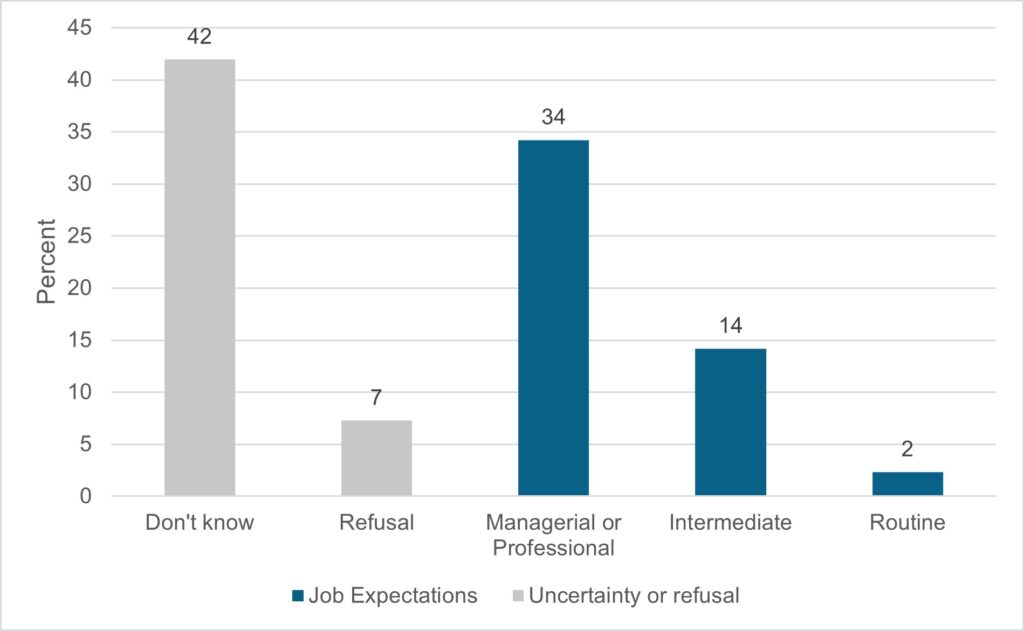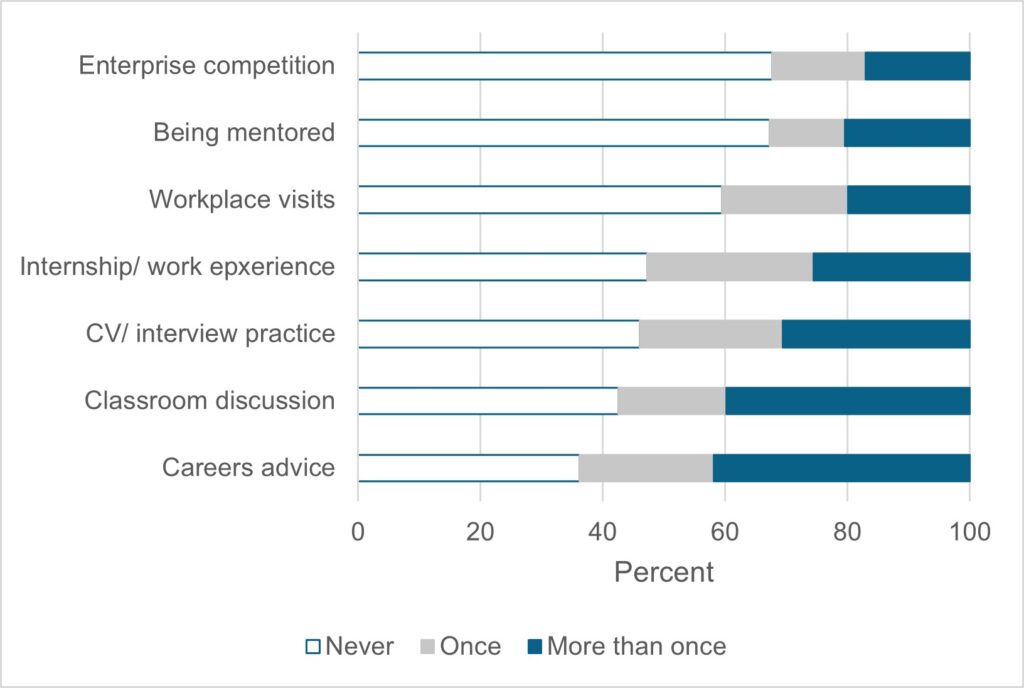By Ingrid Schoon and Golo Henseke
What are the career expectations of young people aged 16-25 in the current climate of economic uncertainty – and how do schools prepare them for the transition into the labour market in the aftermath of the Covid-19 pandemic? These questions are examined in a new report out today (July 21). The report is part of a large-scale project to track youth employment, learning, career development and wellbeing during the pandemic in the UK and abroad.
Career expectations
Based on data collected in March and again in May 2021 from a representative sample of 1,542 16 to 25-year-olds in Britain we find that young people have ambitious educational and occupational goals, although there are high levels of uncertainty about future careers.
Young people who had formal career preparation, such as internships were more certain about their career goals, and more likely to take action and look actively for a new or additional job at a time of labour market uncertainty, such as the current pandemic. While education providers take care to include students from across socio-demographic groups in career preparation activities, there is still scope for a more comprehensive approach to career education and employer engagement than there is now.
Most of the young people told us they expected to complete a degree-level qualification by age 30 (58%). In fact, about a third expect to complete postgraduate studies (32%).
Young people were also asked what kind of job they expect to have when they are 30 (see Figure 1). Notably, 42% of young people in our sample did not know. Our data suggest that such career uncertainty was higher among men than women and among those with less-educated parents; those who had received free school meals and among those not in employment, education or training (NEET).
Figure 1: Expected job at age 30 (%).

Target Population 16-25-year-olds UK residents. Source: YEAH Survey. Waves 1 and 2.
We know from previous research that career uncertainty is associated with less advantageous adult employment outcomes, even after accounting for gender, social background, ethnicity, and academic attainment, potentially leading to difficulties in the school-to-work transition, lower wages, and lower lifetime earnings.
Levels of uncertainty in our sample were considerably higher than those in previous studies. For example, in the OECD’s 2018 PISA study, 24% of 15-year-olds in the UK were unable to identify a job that they expected to do by age 30. It is conceivable that the high percentage in our study is due to the phrasing of the survey question. But because our assessments were made during the Covid crisis it seems plausible that levels of career uncertainty have increased to such high levels.
Career preparation
We also asked our sample to recall how frequently they participated in career-development activities such as internships, career advice or mentorships schemes organised by their school or college with employers or local businesspeople (See figure 3).
Figure 3: Career-Development Activity in (upper-)Secondary Education (%).

Target Population 16-25-year-olds UK residents who finished (upper-)secondary education (19+ or <19 and not in education). Source: YEAH Survey. Wave 2 (May 2021).
Careers advice and classroom discussions were the most common activities. About half of sample had done at least one internship or work experience placement. By contrast, participation in workplace visits, mentorships and enterprise competition were less frequent. In all, about 85% of young people had participated at least once in some career preparation during their school years. However, a non-negligible minority received little or no preparation to navigate todays’ job market. And that, in turn, does matter regarding young people’s capacity to navigate the school-to-work transition in the current crisis.
We examined the associations between career preparation activities, career uncertainty and job search behaviour for different subsamples, including those who have left education, NEETs, those in precarious work, and those who were actively looking for a new job during the pandemic (see Table 1).
Table 1: Associations between career preparation activities, career uncertainty and job search behaviour
| Career uncertainty | Job Search | Callback | |
| Career development activities | -.09* (0.04) | .21*** (0.06) | 0.12** (0.04) |
| Control Variables | x | x | x |
| N | 557 | 238 | 296 |
| Target population | 16-25 who left education | 16-25 in NEET or precarious work | 16-25 actively looking for jobs |
* p < 0.05, ** p < 0.01, *** p < 0.001
The first column shows that past engagement in career development activities correlated with a lower likelihood of career uncertainty among those who had left education. Column 2 shows that the likelihood for active job search increased if young people who were NEETS or in precarious work had past engagement with career preparation activities.
Finally, we examined whether career preparation makes a difference in the application process itself. We asked those actively looking for a new job about the number of interviews they were invited to. The results in column 3 show that those who engaged more in career development activities during their school years had a higher success rate of interview offers from a given number of applications. In summary, the data shows that career development activities help to develop more certainty about one’s career goals and provide resources to seek out new or additional paid jobs in an uncertain labour market.
Conclusion
Despite the evident benefits for economic outcomes, loss of job skills learning has received too little attention in public discussions of how to recover lost learning. Strategies for recovery should address not only lost subject learning but also career-related activities, which enable students to make informed decisions and choices about their futures. Through closer collaboration between education systems and employers, opportunities to develop valuable work experience, job skills and professional networks are achievable.
Funding for this research is provided by the Economic and Social Research Council. We are grateful for the valuable inputs of our project team: Andy Green, Francis Green, Hao Phan, and Rachel Wilde. The views expressed here are the authors’.

